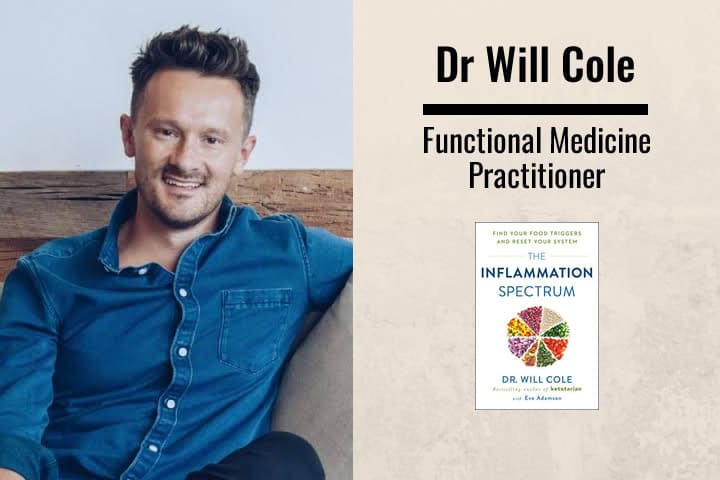Watch the full interview below or listen to the full episode on your iPhone HERE.
Stu: This week, I’m excited to welcome Dr Will Cole. He is a leading functional-medicine expert specialising in investigating the underlying factors behind thyroid, hormone, autoimmune, digestive and brain problems. He is the author of the bestselling books Ketotarian and The Inflammation Spectrum and consults worldwide via webcam, with offices in Pittsburgh.
Audio Version

- How would you describe inflammation?
- Is there a gold standard in testing for food-related/digestive issues?
- Which foods do you find present the most problems for your patients?
Get More of Dr Will Cole
If you enjoyed this, then we think you’ll enjoy these interviews:
- JJ Virgin – Linking Food Intolerances to Weight Gain
- Dr Paul Saladino: The Complete Guide to the Carnivore Diet
- Dr Stephen Cabral – Change Your Body. Change Your Life
Full Transcript
Stu
(00:17)
Hey, this is Stu from 180 Nutrition and welcome to another episode of the Health Sessions. It’s here that we connect with the world’s best experts in health, wellness and human performance in an attempt to cut through the confusion around what it actually takes to achieve a long lasting health.
Now I’m sure that’s something that we all strive to have. I certainly do. Before we get into the show today, you might not know that we make products too. That’s right. We’re into whole food nutrition and have a range of superfoods and natural supplements to help support your day. If you are curious, want to find out more, just jump over to our website. That is 180nutrition.com.au. and take a look. Okay, back to the show.
This week I’m excited to welcome Dr. Will Cole. Dr. Cole is a leading functional medicine expert specializing in investigating the underlying factors behind thyroid, hormone, auto-immune, digestive, and brain problems. He’s the author of the bestselling books, Ketotarian and The Inflammation Spectrum and consults worldwide via webcam with offices in Pittsburgh. In this episode we talk about the rise in allergies, sensitivities and autoimmune conditions and the best methods to test and treat these issues. Now, the audio is a little sketchy on this conversation, but hold tight as the information Dr. Cole shares is priceless over to Dr. Cole.
Stu
Hi guys, this is Stu from 180 Nutrition and I’m delighted to welcome Dr. Will Cole to the podcast. Dr. Cole, how are you?
Dr. Cole
I’m doing great. How are you?
Stu
Very well, thank you, and again very appreciative of your time. I know you’re a super busy guy and we’re going to get into what you do in a minute, but first up, for all of our listeners that may not be familiar with you, your work, your books, et cetera, I’d just love it if you can just tell us a little bit about yourself please.
Dr. Cole
Yeah. So I am a functional medicine practitioner. So my day job is consulting patients around the world, via a virtual functional medicine practice. So we’re consulting them via webcam. My job is to get to the root cause of why they’re struggling with their health issues. So whether that’s auto-immune issues or hormonal problems or digestive problems, neurological issues, my heart and passion is really to find out why they’re struggling. And it’s really a sacred responsibility in my opinion. It’s a sacred responsibility for me at least to be a part of somebody’s health journey. So yeah, I’ve been doing this for 11 years at this point over that, consulting patients online and my post doctoral education and training is in functional medicine, clinical nutrition. That’s really what my passion is and I’m immersed in that space. Getting labs and getting super geeky and putting numbers on spreadsheets and people will have reasons of why they feel the way that they do.
And yeah, when I’m not seeing patients, I’m writing about functional medicine. So I’ve written articles for the past 11 years on these topics and I [inaudible 00:03:31] instructor and wellness expert for mind body green, one of the largest websites in the world for a long time. They launched shortly after that for Goop, which has been a [inaudible 00:03:42] wellness brand as well. I cohost the Goopfellas podcast, which is Gwenyth and Elise’s first spinoff of the main Goop podcast with Gwenyth and Elise host the main one and my friend Seamus Mullen and I host the Goopfellas podcasts and I write books about this stuff too. So I’ve written Ketotarian, which is the mostly plant-based ketogenic book and The Inflammation Spectrum, my newest book. Which is about inflammation and how inflammation exists on a spectrum and all food and non-food ways, lifestyle ways to calm inflammation because it’s such a commonality between so many health problems, autoimmune conditions, neurological symptoms.
Dr. Cole
So, I mean it all comes back down to that one message, which is functional medicine and giving people agency for their wellness. But it looks differently depending on [inaudible 00:04:35] consulting patients are on a podcast or writing a book.
Stu
Fantastic. And it was The Inflammation Spectrum that prompted me to reach out to you as well because that word inflammation seems to have evolved over the last decade from something that Joe public, myself included, may have thought, I fall off my bike, my knee swells up, it’s inflamed, that’s inflammation. But now it seems to have made its way through to the other side of health in terms of all manner of different kind of health issues that are arising today. So I’m keen to hear how the expert describes inflammation.
Dr. Cole
Yeah, thank you. Inflammation, you’re right. It’s a very nebulous term as far as for the lay person. What the heck are we talking about? Because people can think of it around, broke like a hurt knee, swollen elbow. They can understand that inflammation, maybe they think of it sore muscles and joints. That’s inflammation. Or maybe a headache, that’s inflammation. While that all is true, these are all signs of inflammation. Most acute inflammatory problems, but what I’m talking about and what the doctors and researchers are talking about typically when they’re referring to inflammation, is chronic inflammation. It’s different than acute inflammation, so chronic inflammation is really the commonality between just about every health problem out there, but look, inherently, inflammation is not bad. It’s a product of our immune system. It fights viruses, it fights bacteria. It’s important from a [inaudible 00:06:09] cell membrane standpoint.
It’s needed for human health. The problem is when inflammation is thrown out of balance. It’s the Goldilocks principle, right? Everything in the body is subject to that. Not too high, not too low, but just right. All hormones apply to that law. Our gut microbiome applies to that law, balance, balance. And same with inflammation, so it’s really chronic inflammation. It’s that forest fire and use that analogy burning and perpetuity, that’s the issue. It’s a lack of balance and we’re seeing that on a microcosm and macrocosmic level. People have microcosmic… they’re on a microcosm level, they are struggling with this sort of burning a forest fire on a cellular level. And then it’s happening globally as well at a microcosm level because people are… That the world’s out of balance as well and things and our climate are changing because of a lack of balance.
Dr. Cole
So it’s, as you know, as above so below in many ways. And we are part of nature, the human body and we’re seeing climate change in body in the form of chronic inflammation. And that’s why you see epidemic rise of diabetes, heart disease, cancer, autoimmune conditions, these are all inflammatory.
Stu
Given the breadth and depth of inflammation, what tests would you typically utilize to measure and monitor and pinpoint exactly what’s going on?
Dr. Cole
So from a lab standpoint, and these are the labs that I run for patients. I mean you don’t need a functional medicine doctor to run them. You could have a local GP run a lot of these but they are high sensitivity C-reactive protein, HSCRP, functional medicine. We want those to be under one. Homocysteine is another inflammatory marker in functional medicine. The optimal range for homocysteine is under seven and then you can look at ferritin, which is a biomarker for storing iron. It’s also considered an acute phase reactant, so basically in states of inflammation you can see a ferritin spike above 250, depending on if it’s a male or female, if they’re menstruating or postmenopausal. That optimal range will vary, but basically you want to look out for high ferritin and then putting that in context with iron and iron saturation to make sure it’s not iron overload or hemochromatosis, but it’s in fact a sign of inflammation, ferritin being high.
Dr. Cole
(08:43)
And in functional medicine we’re running more comprehensive labs, so things like gut centric, inflammatory markers like calprotectin and lactoferrin [crosstalk 00:08:52] and we are running gut impermeability issues. Leaky gut syndrome. Looking at cross-reactivity feeds that mimic different inflammatory proteins. We are looking at genetics. I mean, some people just genetically more prone to higher inflammation levels. People with different methylation genes, snips or single nucleotide polymorphisms like MTHFR, MTRR, COMT. There’s other ones that mentioned that are some things that I look at and the endocannabinoid system, the ECS, which governs a lot of stuff in the body, namely inflammation and the gut is rich with these CB1 receptors that certain people with these gene variants are just more predisposed or more likely to have more fruity activities, more inflammation, more reactive systems. So we’re all different. So we have to look at this biological individuality, which is really the heart of functional medicine. We’re all created differently and there’s not a one size fits all approach to aid or wellness or health or inflammation and what causes inflammation.
Stu
(09:58)
Yeah, fantastic. Yeah, certainly a lot to take on. And I’m, I’m particularly interested in, you mentioned inflammation in the gut in terms of allergies, sensitivities and the rise in autoimmune issues as well. And I’ve been cast into that world because our 11 year old daughter has ulcerative colitis. So we’ve been working with lots of functional medicine practitioners in that space. But I’m keen to hear your thoughts on which seems to be reasonably rapid rise in the prevalence of these allergies and sensitivities. Because I remember when I was at school 30 plus years ago, nobody had an allergy. People didn’t have sensitivities, weight didn’t seem to be an issue in the school. And now my daughters have got friends with EpiPens and they’re allergic and sensitive to everything under the sun.
Dr. Cole
(10:51)
Yeah, oh my goodness. Yeah. My heart goes out to those people going through that. And those are my people as far as the people I spend most of my time with are people with these different immune mediated, autoimmune issues, reactive system. It’s going by leaps and bounds and it’s researched or looking at this growing mismatch between genetics and epigenetics and our genetics haven’t changed, research estimates, in about 10,000 years.
(11:18)
But yeah, our world has changed very dramatically in a very short period of time. So our food supply, environmental toxins, stress, technology, all of these things are awakening genetic predispositions that have been around for 10,000 years. But they’re being awoken and triggered like never before because of the onslaught of epigenetic truths. So, that’s going to manifest in different ways. Whether that’s going to be allergies, food sensitivities or autoimmune reactivity, some immune mediated response. And yeah, just like you’re seeing a growing rise of different allergies, kids with EpiPens. Schools are seeing that, you’re seeing that on airplanes or knowing they can’t serve peanuts because there’d be an allergy. School [inaudible 00:12:07] similar numbers for autoimmunity, which is not an allergy but it’s still an immunity issue.
(12:14)
It has to do with an immune system out of balance and research estimates that there’s over a hundred different auto immune conditions that we know today and another 40 above that 100 gut health conditions that at least have an autoimmune component. And really as time goes on, and I have no doubt sadly that more and more things will be discovered to have autoimmune components to them. And researchers are looking at heart disease and looking at cancer and they’re looking at very, very common things. [inaudible 00:12:48] immune components too. So if you take those things into number, it’s sadly, the majority of human race so just because something’s
(13:00)
Common doesn’t necessarily mean it’s normal. These growing health problems, people need to wake up and realize that the way we’re doing life today, our genetics are not enjoying this and we are really, just like we’re irritating our world, we’re irritating our own biochemistry and balance as well because of this mismatch.
Stu
(13:23)
Do you think fad diets play part of this problem in terms of right now it just seems like we still don’t know what to eat. We have got vegetarian/veganism versus paleo/keto/carnivore. We’re pulling lots of food groups out of our diet, which I’m imagining would change a microbiome over time without the consumption of these foods. It just seems to be mass confusion in terms of we still don’t know what the optimum diet is and I know it’s unique to everyone, but is that part of the problem do you think?
Dr. Cole
(14:00)
It is. It’s this dichotomy of time that we live in. It’s growing amount of content and content, endless vortex of Dr. Google information. It’s amazing, we have an amazing information on their fingertips, but it is quite disillusioning and can add to the problem unintentionally that the unintended consequences of all this content without context is an issue.
(14:28)
A content without the vessel to receive that content. Because you’re a lay person, whoever is out there, right? They are the lay person, whoever the person is taking in this information. They don’t necessarily have the vessel to contain all that information and it’s too much and it’s short circuit for people’s spirits and emotions and mental health and it’s not good for their health. Stressing about health. And I understand that when I put an article out there or I write a book, I mean I think articles and podcasts and maybe part of its online, it’s like you don’t know everyone that’s going to read that and you don’t know, you’re not there to walk them through the article and to really give them, especially if people aren’t even reading the article, they’re just reading headlines.
(15:26)
It’s the title. It’s the headline.
Stu
(15:28)
Click, click bait, exactly.
Dr. Cole
(15:32)
Because, they’re not even reading the articles cause actually if they read the articles, most of the time they would be able to contextualize that themselves or they’re reading articles they just look at the headlines and scroll and look at the stuff. So that’s a problem cause they’re seeing coconut oil is going to kill you. And then the next time there’s a coconut oil is a wonder. And that goes on to every other thing. So that leaves, like you said, that the average guy or woman or person out there are disillusioned, disenfranchised and stressed. And hopefully if they read beyond the headlines and get a reputable source. I mean my goal is not to add to someone’s stress, it’s just to give people information that’s digestible, that’s approachable, actionable, that’s realistic, that’s sustainable for people.
(16:22)
Cause I agree. I think that the food tribalism and orthorexia that stress and shame about eating healthy is actually not good for the average person. And I am in this space and that overwhelms me, the amount of content people are reading. I can’t imagine the average person. I would just probably be throwing my hands up and try to ignore it because it’s too much. So I’m aware of it. I see it, my patients, but you know, I tried to shed light on their case is what works for them may not be necessarily appropriate for the next person.
Stu
(16:56)
Exactly. Right. Yeah. Blanket confusion across the scale. And I, and I come about that personally myself with all of the experts that I’ve connected with and I’ve had microbiome sequencing and DNA sequencing and I track my sleep and I’ve got my hormones done, heavy metals done, and I’m still confused. Then that would be a great segue into your book, The Inflammation Spectrum, in terms of just shedding much more light on this topic and then guiding us through perhaps the foods that could cause issues or perhaps the foods that could heal. So for everybody that hasn’t heard about it, hasn’t read the book, The Inflammation Spectrum, what could we expect from it?
Dr. Cole
(17:38)
Well, it’s a exploration in, first of all, educating the reader about inflammation, how it’s connected to so many issues, mental health issues like anxiety, depression, fatigue, autoimmune conditions, and just some problems, detoxification issues. I mean, we go on and in a deep dive and then it’s to educate the person where they’re at on the inflammation spectrum. Yeah. To do something. So there’s, again, not fear-mongering or you know, making someone become a hypochondriac. This is just saying, these numbers speak for themselves as far as the growing rates of health problems. You have to know what we’re up against to do something about it. And it is not an overstatement to say these things are growing and it’s not beneficial to be a super extremist; overly really dramatic about something and scare people, but it’s also not good to ignore it and just to say, everything’s fine There’s nothing you can do about it.
(18:47)
The truth is almost always almost somewhere in the middle. And I take a very middle approach for a lot of these things and look at what I have seen over the past 11 years really make a powerful influence on people’s biochemistry and health because while these inflammatory issues are on the rise, the other side of that coin is that we understand them now more than ever and they are largely things we can support and overcome and improve and heal from. So if we could do the action, why would we settle for anything less? So the book is really nice integration of that. How inflammation exists in a spectrum from mild symptoms like maybe some low grade fatigue, background anxieties, [inaudible 00:19:29] bloating or some muscle tightness on one end of the inflammation spectrum all the way to the other end, which just the open autoimmune disease, diabetes or a mental health issue and then everything in between.
(19:40)
So it’s looking at food because every food we eat after feeds inflammation and fights it. It’s looking at food, but it’s also looking at non food things. It’s not just about food to look at stress and toxin exposure and sleep and social isolation. Screen-time social media addiction. All these things are also influencing our biochemistry as well, and sometimes it’s very easy in this space to be overly myopic on just food because hopefully, we’re all eating, but the reality is there’s a lot of non food inflammers as well.
(20:11)
Again, not to add to your pile of things to stress about, but just to lean into this information, to inform yourself, to empower yourself to find out what your body loves, because I know on the other side of that process, when someone’s feeling lousy and they start feeling like themselves again, feeling empowered again, feeling healthy again and lowered inflammation again, they have a place of strength, your principle place of clarity and agency over their health, and it’s so disillusioning at this point when you’re feeling out of balance, both physiologically and mentally, emotionally out of balance to really get in and find out what works for your body.
(20:50)
So it’s really the goal of the book is to help people to find peace in their life. Food, peace, mental, emotional peace. That’s really the goal of it all. So it’s not about restricting or eliminating foods for the sake of it. It’s about calming inflammation levels down to send to yourself both on a physiologic level as far as calling inflammation, calming hormones, calming gut microbiome, et cetera. But also calming your spirit and creating a safe state sense of stillness in your life so you can eat, ultimately get to a place of intuitive eating. And that’s why I didn’t make any blanket statement, indictments on bio individuality because the foods would be removed for a couple of weeks, are then reintroduced. Even the ones that I know research shows are going to be probably more problematic to most people. But I’m leaving the openness to saying they maybe 5% of people or 4% of people that could eat this food and be fine with it.
(21:54)
So while I’m giving the data on what research is showing is like maybe this, whatever food we’re to you about is problematic. Look, I still want you to experiment, as the reader, you see if it works for you or not. If it works for you, if you feel great eating it, enjoy it. I want you to, like you said, have variety, not remove things for the sake of it. But if something’s not working for you, it’s not restrictive or punitive or obsessive to avoid something that makes you feel lousy. It’s gets the reader to a place that, wow, I love feeling better and more than I miss that food and that food was sabotaging me and moving me away from my goals. So that’s really the place that I want people to get at. It’s not to follow one specific way of eating, it’s just to find out what works for the body for food and non-food thing.
Stu
(22:39)
Fantastic. Exciting. So if, as a reader, I’m reasonably switched on about everything outside of the food spectrum, so I’ve got you, I meditate, I’ve got a movement plan, I sleep well and I’m mindful of toxins, EMF, things like that. But I really want to find tune my nutrition. You mentioned that there were a sub section of foods there that really affect the majority of people and there might be a small subset that are fine with them. I just wanted, if you could just share a few of those for our listeners.
Dr. Cole
(23:14)
Yeah, so what I call the core four in the book, and those are, everyone’s removing those for a time, pumping down to recenter their immune system and they can reintroduce it one by one. We teach how to do that in the book. But those would be grains, added sugar, high Omega-6 oils like canola oil, vegetable oil, industrial seed oil and dairy. Then we talked about the subsets of those, the different types of dairy, the different types of grains. I’m saying the core four foods, but there’s nuance, there’s a spectrum even underneath those four foods.
(23:50)
And then there’s the more advanced track in the book is for people that scored higher on the quiz in the book. They do the eliminate track, which is the core four plus four more or eight foods. So that’s going to be the core four plus nitrates, which was peppers, tomatoes, eggplant, goji berries, white potatoes, nuts and seeds. Legumes or beans and eggs. So let’s eliminate. So for the core four, they removed those four foods for four weeks and then they reintroduce them. And the eliminate track is eight foods for eight weeks and then they slowly reintroduce them. So this is all adapted from things that I’ve seen and worked for people over the years, consulting patients and clinical nutrition studies and just experience.
Stu
(24:36)
Yeah. And I guess for, for everyone listening to this or, or perhaps the majority of people listening to this they might think, wow, that’s all I ate. So I’ve got my grains, legumes and dairy and, and whatever. Like where would you start?
Dr. Cole
(25:01)
[Inaudible 00:25:01] Human being?
(25:01)
So I’m showing the studies and all of those eight foods and you may find through that experiment, Whoa. I do find on like four of those, but I don’t do fine with the other four. And then the next person they’re going to do fine with the six of them, but not two of them or maybe other person that would be opposite. They do fabulous on six but the [inaudible 00:12:25], so it’s all fine individuality. I do great with milkshakes. I love a tomato, like ketchup sauce, ketchup, but the next person is going to get a flare up from ketchup. I’m fine with eggs, don’t you? So yes, to your point, it’s to find out what the alkaloids, lectins, the albumins, the caseins, all the different protein compounds in these foods are problematic for some people and not for others. So it’s this interplay gap, the genetics and epigenetics. I’m looking at gene snips and microbiome balance and intestinal permeability and personal preference and stress around food, the interplay
(26:00)
I have that, but if someone is on a more advanced track and they’re like, this is all I eat, there’s still so much other food you can’t eat. It was like tons of recipes in the book, lots of other foods to focus on. It’s really time to maybe go outside of your comfort zone.
Stu
(26:14)
Yeah.
Dr. Cole
(26:15)
And to find out all other delicious ways to eat. And it’s not forever. Certainly not forever. It’s only for a couple of weeks, a few weeks and then you reintroduce these things.
Stu
(26:25)
Yeah. Okay. Well I guess the mantra, if you want change, you have to change something, has never been truer in this situation. So you mentioned weeks there. Typically, with all of the patients that you’ve helped over the course of your time, would there be an average duration that you would see really solid results in terms of, I’ve managed to heal my gut, for want of a better term, in three months. Something along those lines.
Dr. Cole
(26:59)
There’s research to show, and I’ve put some studies in the back of the book, towards the end of the book, the last chapter; some benchmarks the studies show and trajectory wise, what you can expect. Other studies to show that gut healing and calling a patient happens pretty quickly in the first couple of weeks.
Stu
And obviously with someone with an overt autoimmune condition, they may never get to 100% but there’s still so much you can do to decrease the frequency and the intensity of the flares, get them as better, as great, as their body can allow at that point.
(27:50)
Yeah.
Dr. Cole
(27:51)
So their healing will begin pretty quickly, but that doesn’t mean things are stable enough to stop what you’re doing. You have to keep going and giving your body time to repair what has taken years. I mean, by the time someone is diagnosed, it’s an autoimmune condition, research estimates of these things have been brewing for four to 10 years prior to that diagnosis.
Stu
(28:16)
Yeah.
Dr. Cole
(28:16)
There’s exceptions to that with kids that are triggered with autoimmune conditions, but for most adults these things have been brewing for a while.
Stu
(28:24)
Yes, absolutely. And I guess it’s kind of like just stepping away from the fire. If you’re getting burned, just like you said, follow the plan in the book, start pulling out these things that, and oftentimes the things that you’re most reactive to are the things that you are so beholden to, you just don’t want to let go. So habitual.
(28:43)
So I’m just coming up on time and I’m very mindful of your time as well. I just wanted to dive into you personally, and just wondered if you could share the strategies that you personally use to optimize your own health. And that might be outside of food, it may be sleep strategies, movement, exercise, mindset, any of those things that keep you in top shape.
Dr. Cole
(29:07)
Yeah. Well, I mean food wise, I eat a Ketotarian diet, which is a mostly plant-based ketogenic. That’s where in my book, [inaudible 00:29:17] was how I ate.
Stu
(29:17)
Yeah.
Dr. Cole
(29:17)
So I do a cyclical Ketotarian. I’m not always in ketosis, I don’t need to be, where I’ll be in ketosis and then I’ll moderate my carbs when I want to. I do it cyclically throughout the week. And that’s why I think that most people can do it, and benefit because it maintains metabolic flexibility.
Stu
(29:37)
Yes.
Dr. Cole
(29:37)
They don’t need to always be in ketosis. But most people are only in sugar burning mode. So it’s something that they have to actually build the metabolic flexibility first. So I recommend doing it for eight weeks at least to get that place. And it’s a clean, it’s what I would call mostly plant based, or mostly like pescatarian keto diet. What I call in the book is the vegaquarium diet.
(30:05)
It’s still mostly plant centric but wild caught fish and grass fed beef occasionally too.
Stu
(30:09)
Okay.
Dr. Cole
(30:10)
And so that’s food, it comes first there. And I intermittent fast or do time restricted feeding in the morning. So I am fascinated by the concept, or the mechanism, physiological process of autophagy.
Stu
(30:26)
Yes.
Dr. Cole
(30:26)
Cellular cycling, which is cellular renewal, anti-aging, anti-disease mechanisms in the body, which the ketogenic diet does because it’s a fasting mimicking diet. The Keto diet is, specifically when it’s nutrient dense like ketotarian is.
(30:43)
So I’m typically doing a 12 to 6.30 time restricted feeding window, where I’ll break my fast by noon-ish. And I’m consulting patients all day long, so it’s quite easy for me because I’m not really thinking about it. I’m not sitting around mulling around about food. I’m just focusing on consulting patients, and then have lunch towards one. So I will break my fast then and then I’ll have maybe a snack in the middle of the day, and then I’ll have a big dinner in the afternoon when I get home.
(31:12)
And there’s different ways to do TRF, time restricted feeding [inaudible] fasting. I talk about it in the book, it’s not the only need to do it. But I will have Earl Grey tea in the morning, which is a quite common tea. It’s a black tea with bergamot, which is a citrus [inaudible 00:31:29] there’s studies to show that bergamot has been shown to increase autophagy as well.
Stu
(31:34)
Okay.
Dr. Cole
(31:35)
And cellular renewal. So I like to marry the benefits and amplify, optimize, enhance the benefits of autophagy with the Earl Grey tea in the morning. And there’s another fasting tea that is caffeine free, which I use sometimes too. It’s just cinnamon and bergamot. If someone wants to caffeine free option, but still get the bergomont autophagy benefits. Or you could add a bergamot essential oils and water too [inaudible 00:32:01].
(32:02)
So that’s typically my day. And then holding space for patients and myself is really important because I’m talking to patients online about some heavy things, that they’re going through an autoimmune flare and they’ve tried everything, and my heart just breaks for them and I have to hold space for that heavy stuff. We’re not talking about don’t eat McDonald’s.
Stu
(32:25)
No, that’s right.
Dr. Cole
(32:26)
Heavy stuff that wrecks people’s lives.
Stu
(32:29)
Yeah.
Dr. Cole
(32:29)
So I have to keep my head and my heart open and healthy for people. So mindfulness meditation is something that I have to do as part of my job, because I have to really be present and be focused for them and hear them; because that’s the duality of what I do. It’s [inaudible 00:32:47] functional medicine. There’s the science, which you have to be alert for to know what labs to run and look at the data. But it’s the art of it too, and listening to their words and holding space for them, and the space between their words and understanding just the energy frequency that there are going through and the pain body that they have because of the trauma they’ve gone through.
(33:06)
So it’s definitely a big responsibility, but because of that it’s helped me grow my mindfulness muscle, and I have a long ways to go. Really practicing mindfulness and present moment awareness is something that I have to do. So it forces me to practice that, to really be at the top of my game. And yeah, so I work out a couple of times a week, probably four-ish times a week. I’ll do burst training, HIIT interval training circuits, or I have a Peloton bike and I’ll do some HIIT Tabata training there. I don’t stretch enough. That’s one thing that’s like my new year’s resolution, I do not stretch enough. And yeah, so that’s a typical week for me.
Stu
(34:00)
Fantastic. And I know that a lot of people are going to find that fascinating. And particularly the meditation as well, because I know that with all of the constraints that your job lays upon you, you must have a lot of mind chatter going on. And I’ve particularly found that meditation has been profound to turning off that chatter.
(34:20)
And I’ve been useless at meditation, struggled with it for years, but I’ve recently stumbled upon the Muse headband, and that has been game changer. Because it works with technology and that’s kind of what I’m into all day long, and you can see real time feedback. And it has taken my sleep into the next level too. So that is…yeah. Oh fantastic.
(34:45)
So just a couple of wrap up questions. Intrigued as to what’s next? What’s next for Dr Will Cole? What have you got in the pipeline?
Dr. Cole
(34:56)
Well still my main focus is patients. Consulting patients, that’s not going to change. I get asked to speak to at some places, so typically I get to bring one of my kids. I have two kids, [inaudible 00:35:07] year old son and 10 year old daughter. On the long weekends them and my wife, we all get to go to different cities and I talk about this stuff.
(35:14)
But I’m seeing patients in the clinic and online all week, so I like to take them with me when I go to travel. So get to go to different cities and talk about inflammation spectrum, tearing or just functional medicine. So I’ll be speaking more about the books over the year. I’ll be working on my third book as well. I can’t talk about the concept of it yet, the publisher would get me if said something. But I’ll be working on that.
(35:44)
And I co-host goopFellas, which is a weekly podcast I mentioned earlier, it goes out every Wednesday. We’re coming back with a Keto talk. I’ve co-hosted that podcast for two years with Jimmy Moore. We’re going to come back and talk about more things than just keto. We’ll talk about intermittent fasting and mental health, and all this other stuff too in the space of health and wellness.
(36:05)
So that’ll be coming back real soon. So a lot of cool stuff.
Stu
(36:11)
Yeah.
Dr. Cole
(36:11)
And I have an amazing team that helps me keep all this stuff together.
Stu
(36:15)
Exciting times ahead. So for our listeners, they want to find out more about you. They want to order the books, they want to dial into your message. Where can we send them?
Dr. Cole
(36:25)
Thank you. Everything’s at drwillcole.com. That’s D R W I L L C O L E.com. And they can see me on Instagram @drwillcole too.
Stu
(36:36)
Brilliant. Fantastic. So Dr Cole, really appreciate your time today and look forward to sharing your message with our audience. I know that they’re going to get a lot out of it. Thank you so much. Okay, take care.








